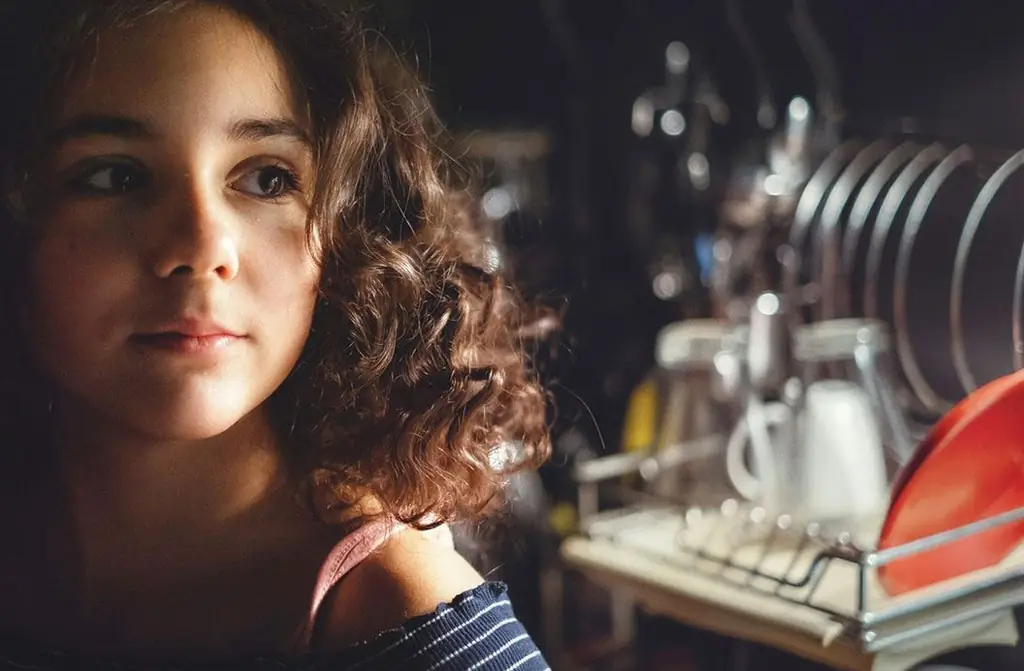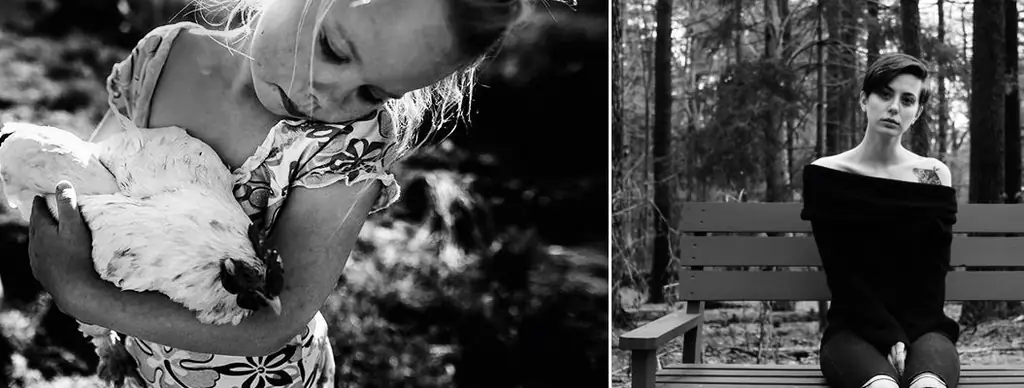- Author Adrian Jeff jeff@psychologosportal.com.
- Public 2023-12-17 05:06.
- Last modified 2025-01-24 14:09.

Resentment and gratitude for the crumbs of mother's love
The fate of children whose relationship with their parents was painful and traumatic is difficult. Dasha's life scenario is conditioned by her past. A girl who grew up in a family where she was humiliated, insulted, will unconsciously look for those who remind her of her parents …
Children first love their parents, then they judge, then they regret.
Marina Tsvetaeva
Mother and daughter
High-rise building. Middle of a day. Quiet. The children will be back from school soon, and it will be noisy for a while. The windows of my apartment overlook the courtyard, and every day I see the same picture. Dasha, my floormate, is returning from school. She reminds me of a useless, abandoned puppy. Tousled hair and a dull look, a long wait on the stairs under the door of a locked apartment. A look that instantly clears up when she sees her mother.
- Mom, today they gave me "excellent" in history!
- So what? Give you a medal for that? Just try to study badly.
- Mom, I did everything that you asked.
Dasha is twelve. She looks her mother in the eyes, reaches for her hand. The mother hides her hand in her pocket and, looking away, angrily says:
- I did it and I did it. What to shout about this to the whole world? I’ll also see if it’s good, otherwise it’s always necessary to redo after you, clumsy.
The girl shrinks and tears appear in her eyes.
- You can't say a word to you, brat, go home quickly. There is nothing to shed tears in public.
The walls of a panel house are not an obstacle to sound. From Dasha's apartment I often hear harsh cries, separate words: "armless", "who will need you", "stupid" …
Dasha is growing, but still her eyes, like the eyes of a beggar, beg for at least a little affection and love. Rarely, but I meet her with glowing eyes, and then, as if making excuses, she says: "And my mother and I …"
Dasha just turned 18 when she got married. None of the neighbors have ever seen this guy before. Short, strong, serious, or rather stern, at the age of 25 he is already starting to go bald. How he beckoned the girl, with what kind word, with a promise - is unknown. Only a year had not passed since she returned to her mother. Even more silent, with her head pressed into her shoulders, as if wishing to hide from invisible stones flying into her. And the ex-husband kept watch for Dasha at the entrance for a long time, and his curses and accusations were heard. Only once, when he ran into me on the stairs, in response to my question: "What happened?" - she said: "I was deceived, Aunt Tanya."
The fate of children whose relationship with their parents was painful and traumatic is difficult. Dasha's life scenario is conditioned by her past. A girl who grew up in a family where she was humiliated, insulted, will unconsciously look for those who remind her of her parents.

This happened with Dasha when she got married. Her state of oppression, depression, humiliation, characteristic of a person with a scenario of failure, attracted another tormentor, now her husband. The life path that the girl has to go through is likely to be thorny. Not only boulders of failures, failures of mistakes, but also the burden of resentments accumulated in childhood will prevent her from going to a happy life. A person with an anal vector, with a negative childhood experience, tends to feel resentment, a feeling of guilt instead of gratitude for a happy childhood.
Resentment
Love, care and a sense of security received in childhood are a support for a child in later life, serve as the basis for trust in the world, in other people. If a child with an anal vector is humiliated, insulted, neglected, constantly scolded for mistakes, rarely praised, he grows up with a feeling of injustice, lack of receiving. After all, such children are diligent, obedient, strongly attached to their parents and expect praise from them, confirmation of the correctness of their actions.
One of the main desires of the owner of the anal vector is the transfer of experience from generation to generation. And a child with an anal vector is born with the potential ability to absorb this experience and traditions from the parents and pass them on. But what does a child get in a dysfunctional family atmosphere? Not a blessing, but a bad experience. What will he pass on next than share? With what I got:
- He will be ready to obey for the sake of crumbs of love, proving what he is capable of, expecting praise.
- Or, on the contrary, it will humiliate others.
- He will forge a sword from his grievances and threaten the world, blaming everyone for his suffering.
- Or, feeling sorry for herself, she will quietly cherish the feeling “my life has failed”, relinquishing responsibility.
Living with resentment
An offended person unconsciously everywhere seeks and finds confirmation of the past attitude towards himself, generalizes, repeats his childhood experience and every time he is convinced that he is worthless and not worthy of good. He takes offense and suffers. The inability to rejoice, receive and give is also a consequence of resentment, fixation in the past, inability to live this life, lack of the necessary skills to love and accept love.
Instead of a feeling of support and security, such an adult feels defenseless in front of the world, instead of deep positive feelings - a boil of resentment. There is no place for trust - suddenly another sharp stone …
How to receive, if you are unconsciously suspicious of everything? How to give if you expect punishment for it? A frightened little child continues to live inside. Without love, without support and vitality, with pain, disappointment and resentment that did not allow you to become a truly adult person.
And it turns out that the load of grievances affects what happens in life, what kind of scenario a person lives. The more they are accumulated, the more unsuccessful a person's life is.
Accusing parents
Despite the fact that grievances poison our lives, many of us are not ready to part with them. Blaming parents for not giving something, disliking, earning little, earning a lot, humiliating, spoiling, we put all the troubles of the world on the shoulders of our parents. But how can you become an adult if you continue to be a little offended child in your soul?
Only by recognizing responsibility for our lives, by justifying and forgiving our parents, can we reconsider this childhood experience and get rid of the heavy legacy of the past.
Parents' justification
“I grew up without a mother, and my father did not love me,” Dasha’s mother began her story. - He drank, beat, yelled, and sometimes he simply did not notice. Fed, dressed, goes to school. What else? As soon as I could, I dropped out of school and went to college. Received a profession. The guy turned up. And so it all happened. One had to lift the girl."
Behind a short story that is stingy with feelings is the life of a woman - who did not know love, who did not receive support, a man's shoulder, and therefore a sense of security, security. Why was she cold to her daughter, humiliated, insulted? Because she herself felt bad.
Often our parents, on whom we are childishly offended, themselves turn out to be disliked, offended children. They raised us as best they could and could.
These are our parents - the ones who need help. Those who need to be warmed up. Their life was not sweet either, but they are our parents. They are the ones. Such as they are. This fact must be recognized and you will have to work a lot on yourself in order to stop demanding love and support, and become such support for them yourself.

Forgiveness
A lot of strength and courage is needed for someone who realizes and feels the desire to come into deep contact with parents. It is necessary not to get rid of grievances, but first of all to touch your heart to your relatives. You will say that it is impossible to build relationships on ruins, debris, it is impossible to scratch on barbed wire, stumble upon contempt, indifference or anger. Then imagine what it would be like to touch every stone, every insult. And just remembering those situations and feelings is not enough to relieve the mental pain. A cardinal step is required - the path of the heart, the path of love, kindness, mercy. The path of a growing up independent child. Because we ourselves need this path first of all.
Forgiveness is like giving up the willingness to experience pain and suffering further.
Forgiveness is the acceptance of one's own path, freed from the "splinters", "hooks" and "thorns" of old grievances.
Forgiveness is like saying goodbye to the past.
Forgiveness as understanding oneself and other people, learning life lessons, which gives strength, opens up opportunities to move on.
When we embark on this path, changes do not make us wait: fewer conflicts (no one needs to prove anything now), more joy and understanding, a deep feeling of freedom, love, gratitude. Where a feeling of gratitude lives in the heart, there will never be a place for resentment. And then the scenario of life will definitely change to a happy one.
You can part with the “collection of grievances”, straighten your shoulders and change the sad scenario for a happy life at the training “System-vector psychology” by Yuri Burlan.
From the feedback after the training:
Collect the crumbs of love, soak them with sympathy and gratitude. Add selfishness crushed into flour, knead the dough, bake buns and distribute them to everyone who needs attention, support, care! Tell about your experience, share your feelings, come to the training, and you will be given generously, in full and without deception.






